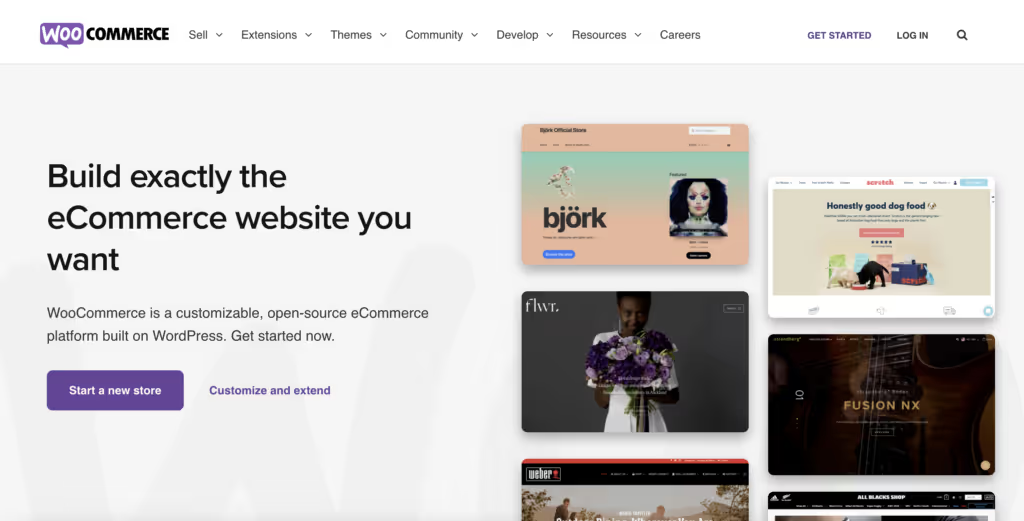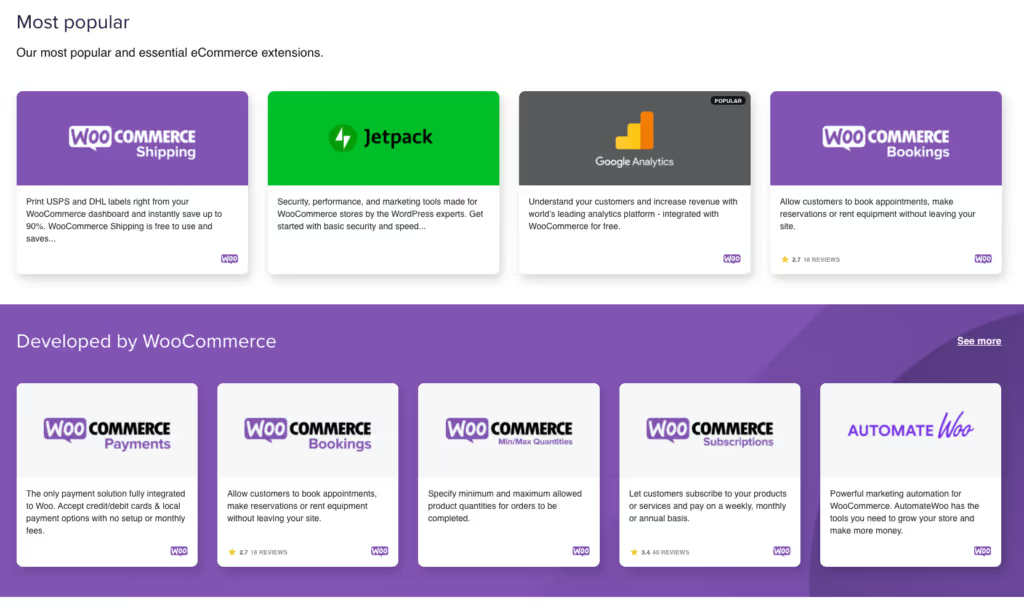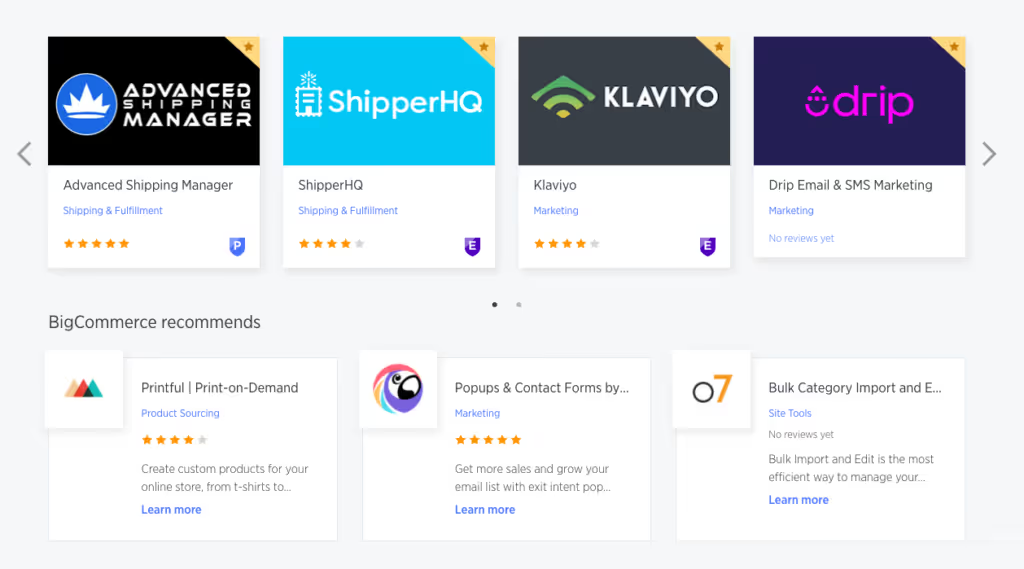WooCommerce vs BigCommerce: Which ecommerce platform is right for you?

As a business owner, it is important to understand which ecommerce platform makes the most sense for your organization’s unique needs. Below, we take you on a deep dive comparison of WooCommerce vs. BigCommerce so that you can better evaluate which platform to choose.
High-level overview
WooCommerce overview
According to their website, WooCommerce is a “customizable, open-source ecommerce platform built on WordPress.”

Think of WooCommerce as an open-sourced plugin on WordPress. It gives your WordPress website ecommerce functionality.
If you have a deep knowledge of technology, require maximum flexibility and prefer the increased design, control, and add-ons, WooCommerce is your best bet. It is also less expensive.
BigCommerce overview
According to their website, BigCommerce allows you to “build a business that’s ready for anything with the flexibility of Open SaaS.”

Think of BigCommerce as a website builder. It gives you an all-in-one SaaS (software as a solution) platform with a suite of options included. The package includes content, hosting, SEO, payment, marketing tools, and many more features.
If you prefer a hands-off approach that includes the benefit of a larger business’s back-end logistics, BigCommerce is an easier platform and right for you.
Platform pros
WooCommerce p
Pricing – There are more free themes with WooCommerce and the additional theme options are cheaper than BigCommerce’s additional theme options. This is the less expensive option, but it can be a headache calculating additional costs compared to an all-in-one plan.
Customization – WooCommerce allows endless options for customizing your website. Remember - this requires intensive time input and the skill of coding to accomplish.
Global Features – It features a multilingual online store along with additional plugins for translation services.
BigCommerce pros
Usability – For those with little to no tech experience, BigCommerce is right for you. Store setup only takes a few minutes and that brief setup allows you to select themes, products, and customization options. BigCommerce works with any content management system, not just WordPress, making it extremely flexible. Their feature, Stencil, allows you to design a beautiful storefront without any knowledge of coding. BigCommerce has the edge when it comes to ease of use when compared with WooCommerce.
Pricing – All-in-one pricing gives you transparency into your costs.
Security – BigCommerce ensures your site remains PCI compliant, meaning you don’t lose any sensitive information. This happens automatically, thus allowing BigCommerce to be considered more secure. Additionally, BigCommerce is more selective about what is allowed in their app market, meaning more control and greater security.
Scalability – This hassle-free, fully-hosted ecommerce platform has very fast page load times and can handle 500K hits per minute. Your site performance is faster with BigCommerce. This scalability feature is important for global stores. For global needs, it also integrates with Amazon and Facebook to help you expand seamlessly.
Platform cons
WooCommerce cons
Usability – It is slightly trickier to set up because it is a WordPress plugin that requires some backend knowledge with domains, and technical issues like security and caching. It can only be used with a WordPress website. There is a steeper learning curve with WooCommerce and it requires a more hands-on approach with the technology.
Security – While WooCommerce offers PCI add-ons, it is your responsibility to keep your site PCI compliant. Security is manual with WooCommerce. This platform is more vulnerable to security breaches due to the hosting of many third-party apps. Because WooCommerce is less selective in the apps hosted, you are opening your website to increased potential threats.
Scalability – There are many customization options and this leads to limited scalability due to the complex structure of add-ons. Things like slower load time, poor site optimization, and blocked site traffic are the impacts of this complex structure and create lower scalability and slower performance.
BigCommerce cons
Pricing – BigCommerce themes are pricier. There are some free themes and then many options for additional themes with a price tag of around $200.
Customization – There are more limited customization options with BigCommerce.
Platform features
WooCommerce features
The WooCommerce platform offers Blogging, unlimited customization if you know how to code, and instant returns through one-click refunds.
BigCommerce features
Built-in features are the key selling point of BigCommerce. Included in the features with all-in-one pricing are SSL certificates, SEO reporting and analytics, shipping, customer groups, refunds and return functionalities, design, and marketing. The multichannel integration with Amazon and Facebook are also key features.
Another great feature is their abandoned cart recovery. This sends emails to your customers if they leave their cart before checking out. BigCommerce claims that this feature can recover 25% of potential lost sales.
Additional add-ons
WooCommerce add-ons
WooCommerce offers an infinite number of add-ons. Over 55,000 of the WordPress plug-in options are free, and WooCommerce offers over 250 free plugins. If you are looking for an added feature, the sky's the limit.

With an additional plug-in, your site can have the abandoned cart recovery feature that is included with BigCommerce’s all-in package.
BigCommerce add-ons
As with WooCommerce, BigCommerce has a large set (200+) of available apps that can be added to an account, covering functionalities in Marketing, SHipping & Fulfillment, Accounting, ERP, and Security.

Top paid apps that are available to add: ShipStation, Google Shopping by Sales & Orders, Justuno, and ShipperHQ.
Top free apps that are available to add: Mailchimp, QuickBooks Online, Yotpo Reviews, and Buy Buttons.
Payment options available
WooCommerce payment options
This ecommerce platform offers a wider range of choices with over 100 different payment options. It also has an in-house payment solution so you can manage your payments from one place.
Stripe, PayPal, Apple Pay, and Square are all included.
BigCommerce payment options
Stripe, PayPal, Apple Pay, and Square are all included, along with some digital wallets like Venmo and Chase Pay.
Support services offered
WooCommerce support services
They offer little to no support services. You are for the most part, on your own. There is a help centre that offers many technical documents, but remember, you must be tech-savvy to utilize these documents and this ecommerce platform.
BigCommerce support services
24/7 Live Support is offered through phone, email, and live chat. They also offer a robust help centre with guides to help you effectively manage your site.
Marketing capabilities
WooCommerce marketing capabilities
With over 120 marketing extensions in their marketplace, WooCommerce offers increased customization but does not provide many built-in marketing tools. Without an extension needed, WooCommerce does support coupons and free shipping incentives.
BigCommerce marketing capabilities
This platform offers valuable marketing features in all of its plan options. These features include coupons, discounts, gift cards, integrations with Facebook, Instagram, eBay, and Amazon, blogging tools, abandoned cart recovery, and product reviews and ratings. There are also over 200 options for marketing integrations in BigCommerce’s app marketplace.
Platform pricing
WooCommerce pricing
This ecommerce platform plugin is free, but costs begin to add up when you need add-ons like hosting, SSL certificate, and other customization features.
BigCommerce pricing
BigCommerce offers all-in-one pricing. You know what your all-in prices are upfront, unlike with WooCommerce. Also, their model is such that, as your online sales increase, so does the price of your plan. This may work well for some businesses, but be a deterrent for others.
Platform reviews
Product reviews are an essential part of any buyer’s decision, and companies are quick to publish their best-ever reviews. And while it’s great to see who loves a product and why, sometimes it’s necessary to take a look at the other end of the spectrum.
WooCommerce - 5-star review
“It's easy to use and easily accessible. I also appreciate their shop theme that helps me to organize my product on my webpage and it's beautiful with demo data so that anyone can easily edit the product from the demo data. I use their mobile app too which helps me to get order notifications as soon as possible.” - Read the full G2 Review here
WooCommerce - 1-star review
“Needs elusive custom CSS unless you use nothing but prefab defaults even with Astra Pro -- aesthetically buggy. They tell you your theme authors need to write you some CSS for things that are nothing but crummy Woo shortcuts in poor code. The only way Woo overcame WP ecommerce was better publicity. WP ecommerce was way less problematic for a person who just wanted it to match your theme global settings.” - Read the full G2 Review here
BigCommerce - 5-star review
“Similar to Shopify but MUCH better for B2B features. Many more features out-of-the-box. We can get by with far fewer apps than Shopify. Great customization options. The basic version does many of the things Shopify Plus does, at much less cost. Avalara works with all versions.” - Read the full G2 Review here
BigCommerce - 0-star review
“It is an empty platform that you have to pay to add on anything useful, most analytics are lacking, everything a normal business would want you have to pay to add on. It is a waste of money. We are presently looking for a CRM to replace it as it does a terrible job. Support sucks.” - Read the full G2 Review here
In conclusion
Remember, there is no one right solution. It is why both of these ecommerce platforms can compete and continue to grow and help businesses across all sizes and industries. If the solution for your business is not obvious after reading through these comparisons, consider asking your peers what they use and why it is right for them. Ultimately, BigCommerce is for the less tech-savvy and those who want less technical overhead, and WooCommerce is for a more tech-savvy team that wants to utilize increased customization and the skillsets of their technical resources.




